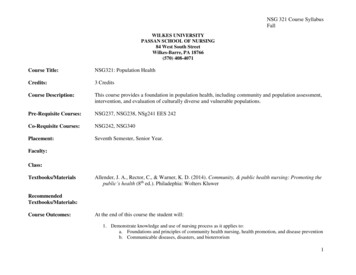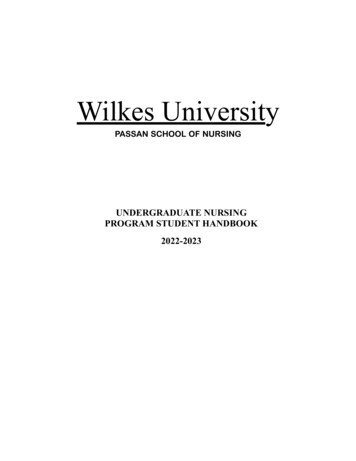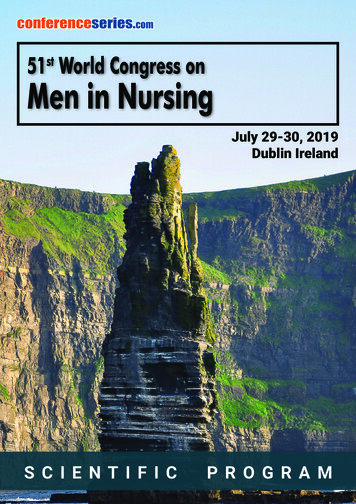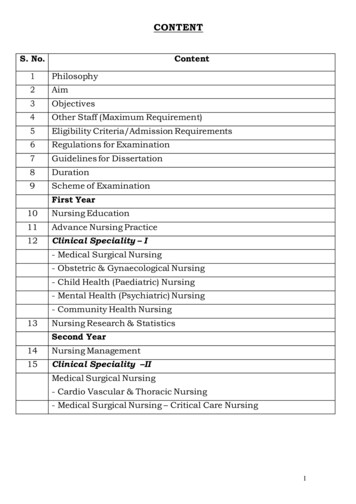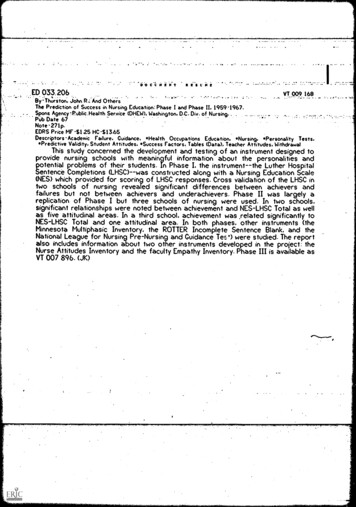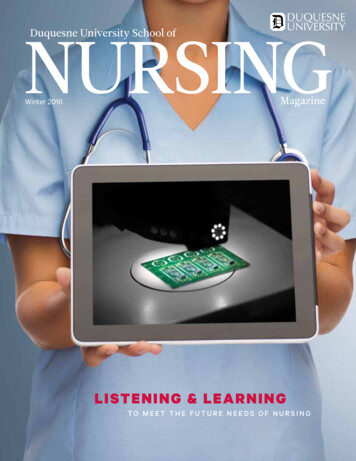
Transcription
THE PASSAN SCHOOL OF NURSINGThe Passan School of NursingDean: Dr. Deborah A. ZbegnerChair: Dr. Emily HavrillaFacultyAssociate Professors: Grandinetti, Havrilla, Hirthler, Lucas, Miskovsky, Sweeney, VictorAssistant Professors: Burry, Jones, KoronkiewiczFaculty of Practice: Cheslick, Hauze, Musto, OlengenskiVisting Instructor: GaydosFaculty Emeriti: Druffner, Malkemes, Merrigan, Schreiber, Stewart, ZielinskiDirector of Clinical Nursing Simulation Center:Accelerated Baccalaureate Nursing Program Coordinator:SundayLPN/BSN Program Coordinator: PacuskaStudent Affairs Coordinator: Drozdis1Wilkes University Undergraduate Bulletin 2022 - 2023
ACCELERATEDBACCALAUREATE PROGRAMAccelerated BaccalaureateProgram for Second DegreeStudentsThis online program admits students who already hold abaccalaureate degree in a discipline other than nursingand have no previous nursing education, Upon successfulcompletion of the program, students are awarded a Bachelor’sDegree with a Major in Nursing (BSN). Completion of therequirements for this program prepares a beginning, selfdirected practitioner who is capable of initiating, implementing,and revising nursing care. The curriculum is designed for theadult learner and builds upon earlier educational experiencesin the humanities, social studies, and sciences. It is basedon the development of the individual and the family within acommunity.The curriculum flows from both the University’s and theSchool’s philosophies and addresses the nursing needs ofthe community and the nation. It provides opportunity forindividuals with changing career aspirations, and it is designedto prepare the learner for a variety of roles in professionalpractice. Following completion of the prerequisite courses, theprogram can be completed in three full-time semesters.Graduates are educationally eligible to take the NationalCouncil Licensure Examination for Registered Nurses(NCLEX-RN), which must be successfully completed forregistration as a professional nurse.Prerequisites Applicants must have received a baccalaureatedegree from an accredited institution with a minimumundergraduate GPA of 3.0. Students who have graduated from an accreditedinstitution and meet all other admission requirements willbe evaluated on a case-by-case basis. Admission is notguaranteed. The following courses are required prerequisites: a 3-credit course in Elementary Statistics a 3-credit course in Nutrition two semesters of Anatomy and Physiology, withrelated laboratory experiences one semester of chemistry, with related laboratoryexperience one semester of microbiology, with related laboratoryexperience a minimum grade of 2.5 is required in the sciences.Students will be allowed to repeat a science courseone time for a grade less than 2.5. A student whoachieves less than a 2.5 in two nurses courses or lessthan 2.5 in the repeat of the same science course willnot be able to progress into the nursing program. Applicants whose native language is not English orwho hail from non-English-speaking countries mustsubmit satisfactory scores on the TOEFL along with theirapplications.2 Check with the ABSN Program Coordinator about theaspect of screening/admission into the program.Length of the Program The total number of credits required to complete theAccelerated Baccalaureate Program for Second DegreeStudents, beyond the pre- and co-requisite requirements,is 48. The Accelerated Baccalaureate Program for SecondDegree Students can be completed in three full-timesemesters.Academic ProgressionFollow the Admission and Progression policy of the PassanSchool of Nursing.[[NSG-330]] : Nursing Practice I - Course components:Fundamentals of Nursing & Medical-Surgical I[[NSG-331]] : Nursing Practice II - Course components:Nursing Care of the Psychiatric Mental Health Client& Medical-Surgical II[[NSG-332]] : Nursing Practice III - Course components:Care of the Childbearing Family (Obstetrics), Careof the Developing Family (Pediatrics) & Leadership/Population Health NursingA student may be required to submit, at any time, a healthevaluation by a physician, physician assistant, or nursepractitioner if evident limitations interfere with the student'spractice or learning.Accelerated Baccalaureate Program forSecond Degree Students*- RequiredCourses and Recommended CourseSequenceFirst SemesterCredits[[NSG-211]] PhysicalAssessment3[[NSG-330]] Nursing Practice 12ITotal Credits15Second Semester[[NSG-224]]Pharmacotherapeuticsand Decision-Making inNursing3[[NSG-331]] Nursing Practice 12II[[NSG-341]] NursingInformatics3Total Credits18Wilkes University Undergraduate Bulletin 2022 - 2023
Accelerated Baccalaureate ProgramLicense to PracticeThird Semester[[NSG-332]] Nursing Practice 12III[[NSG-342]] Introduction toNursing Research3Total Credits15*Clinical Hours will be distributed among Acute, Chronic, andCommunity SettingsAdditional Nursing Expenses and Feesfor Accelerated Baccalaureate ation(NSNA) 45UniformScrub Top 30 - 35UniformScrub Pants 25UniformShoes 40 and upStethoscope,penlight,bandagescissors 55 - 85Hemostats 6BP Cuff 40AHA CPRCertificationfor HealthCareProviders 35 and upCastleBranchProfile 175 and upCriminalRecordCheck 40 and upPA ChildAbuseHistoryClearance 10SemesterTwoCandidates for a license to practice in the health field arerequired to have "good moral character." The PennsylvaniaState Board of Nursing takes into consideration, whendeciding on the applications for registration and a license topractice under their jurisdiction, whether candidates havebeen convicted of any felony or misdemeanor. Candidates arereferred to the regulations specified in the Professional NurseLaw (P.L. 317, No. 69).Biology.8Psychology. 17Nursing. 14SemesterThreePhysical, 100 and up*Immunizations,and PPDUrine forDrug Screen 50 and upThe School of Nursing Faculty reserves the right to revise theNursing Major requirements as deemed necessary at any timeto prepare students for new and emerging roles in nursing.Wilkes University Undergraduate Bulletin 2022 - 20233
LPN-BSN PROGRAMLPN-BSN ProgramLicensed Practical Nurse (LPN) students have the opportunityto challenge five specific courses in Nursing by successfullycompleting examinations from National League for Nursing(NLN) Mobility Examinations. The NLN Mobility Examinationsinclude: Principles of Nursing, Nutrition, Obstetrics, Pediatrics,and Psychiatric/Mental Health. These examinations are usedto facilitate the LPN to RN transition.For details and enrollment information, contactthe Coordinator of the LPN/BSN program.License to PracticeCandidates for a license to practice in the health field arerequired to have "good moral character." The PennsylvaniaState Board of Nursing takes into consideration, whendeciding on the applications for registration and a license topractice under their jurisdiction, whether candidates havebeen convicted of any felony or misdemeanor. Candidates arereferred to the regulations specified in the Professional NurseLaw (P.L. 317, No. 69).Biology.8Psychology. 17Nursing. 144Wilkes University Undergraduate Bulletin 2022 - 2023
NURSINGNursingTotal minimum number of credits required for a major inNursing leading to the BSN degree — 120.AccreditationThe baccalaureate degree in nursing/master's degree innursing/Doctor of Nursing Practice/, and post graduate APRNcertificate programs at Wilkes University are accreditedby the Commission on Collegiate Nursing Education(www.ccneaccreditation.org) .Philosophy and CurriculumThe practice of professional nursing is a deliberative processof assessing, analyzing, planning, implementing, andevaluating care with clients that promotes and restores healthand prevents illness. The baccalaureate program preparesa beginning, self-directed practitioner who is capable ofinitiating, implementing, and revising nursing care.Professional nursing is based upon the integration ofknowledge from the humanities, the physical and socialsciences, and nursing theories and research. The curriculumis based on the development of the individual and the familywithin a community. The curriculum flows from the philosophyand covers a four-year academic period. It includes integratednursing courses, electives, and the General EducationCurriculum requirements. Due to the cultural diversity ofclients, it is suggested that students consider taking a foreignlanguage. Written agreements with the cooperating hospitalsand agencies in Northeastern Pennsylvania ensure clinicalfacilities for the student’s practice, which is concurrent with theclassroom theory. NOTE:Students are responsible for theirown transportation to assigned clinical areas.In addition, opportunities for learning are provided in theClinical Nursing Simulation Center, which is equippedwith computer-assisted instructional materials and withlow fidelity and high fidelity manikins. A simulated clinicalenvironment allows the student to practice the psychomotorskills necessary in nursing practice. A faculty member isavailable to assist the students.Undergraduate Nursing ProgramsStudents majoring in Nursing are required to have completedcourses in English (4 units), Social Studies (3 units),Mathematics (2 units, including algebra), and Science (twounits, including Biology and Chemistry) during their secondaryschool program. The preferred criteria for admission are ahigh school GPA of 3.3 or numeric grade of 87, SAT scores of510 in both Math and Reading (1020) or an ACT score of 21for those students who do not take the SAT's. Students whohave graduated from an accredited institution and meet allother admission requirements will be evaluated on a case-bycase basis. Admission is not guaranteed. Transfer studentsor change of major students must meet the required score onthe nursing entrance examination prior to admission into thenursing program.5The student of nursing assumes all of the financial obligationslisted in the section on fees in this bulletin. Additionalexpenses incurred in the Nursing Program are listed in theNursing Student Handbook. A price list for these items follows.Students must complete the required health and clearancedocuments and submit all requirements as directed byCastlebranch by June 30th every year of enrollment in clinicalnursing courses for the fall semester and by January 5 forthe spring semester. Failure to complete requirements byJune 30th or January 5 will result in the loss of a clinicalseat. Students must contact Lori Drozdis, Student AffairsCoordinator (at lori.drozdis@wilkes.edu or (570) 408-4092) forthe required code.In addition to the required health and clearance documentsnoted above, any student transferring into the nursing programfrom another school or from another program or from anundeclared status at Wilkes University must be in goodacademic standing and must successfully complete the nurseentrance examination before July 1st preceding the start of theentry level clinical nursing course (NSG 210). Students mustalso meet the technical standards essential to the practiceof nursing, as defined in the Undergraduate Nursing StudentHandbook to progress into clinical nursing courses.Satisfactory clinical performance is an essential componentof the Wilkes Nursing program. Students become eligibleto progress into clinical nursing courses when they havemet the following prerequisite course requirements: nursingmajors must earn a 2.5 or better in the required prerequisitesciences (BIO 113, 115-116, CHM 111) and a 2.0 in ENG101. In order to remain in clinical courses and progress inthe nursing curriculum, students must earn a 2.5 or higherin the required co-requisite science (EES 242). Students willbe allowed to repeat a science course one time for a gradeless than 2.5. A student who achieves less than a 2.5 in twoscience courses will not be able to progress into the nursingprogram. Students must obtain a cumulative GPA of 2.5 at alltimes.In order too progress THROUGH the nursing program, allnursing students must: Follow the admission and progression policy of thePassan School of Nursing.In addition to fulfilling the academic requirements of theUniversity, students majoring in Nursing are required tosuccessfully complete comprehensive examinations andrequired studies as assigned by the School of Nursing beforebeing eligible to graduateNursing Major- Required Courses andRecommended Course SequenceFirst Semester[[BIO-115]] Human Anatomyand Physiology I4[[CHM-111]] Fundamentals of 4ChemistryWilkes University Undergraduate Bulletin 2022 - 2023
Nursing[[ENG-101]] Composition* or4[[FYF-101]] First-YearFoundations3[[NSG-117]] Basic LifeSupport elective1Total Credits16Second Semester[[NSG-236]]Pharmacotherapeutics II1[[NSG-342]] Introduction toNursing Research3Total Credits14Sixth Semester[[EES-242]] EnvironmentalHealth3[[BIO-113]] Microbiology4[[BIO-116]] Human Anatomyand Physiology II4[[NSG-237]] MedicalSurgical Nursing II6[[PSY-101]] GeneralPsychology* or3[[NSG-238]]Pharmacotherapeutics III1[[SOC-101]] Intro. toSociology* or3[[NSG-241]] Nursing Care ofChild Bearing Family4[[NSG-217]] Basic LifeSupport elective1Total Credits15[[ANT-101]] Intro. toAnthropology*[[ART-101]], [[MUS-101]], or[[DAN-101]]3Total Credits17Third SemesterSeventh Semester[[NSG-340]] Advanced CareConcepts5[[NSG-200]] Principles ofNormal Nutrition3[[NSG-242]] Nursing Care ofthe Child Rearing Family4[[MTH-150]] ElementaryStatistics**3[[NSG-321]] PopulationHealth3[[PHL-101]] or ForeignLanguage3Total Credits15[[NSG-214]] Pathophysiology 3for Professional Nurses[[CS-115]] Computers &Applications3[[ENG-120]] Introduction toLiterature & Culture3Total Credits15Fourth Semester[[NSG-210]]Principles ofNursing6[[NSG-211]] PhysicalAssessment3[[NSG-215]] Pharmacotherapeutics1I[[HIS-101]] HistoricalFoundations of the ModernWorld3PSY Elective3Total Credits16Fifth Semester[[NSG-213]] Nursing Care of 4the Psychiatric Mental HealthClient[[NSG-235]] Medical Surgical 6Nursing I6Eighth Semester[[NSG-345]] SeniorPracticum5[[NSG-239]] Nursing CareOlder Adult2[[NSG-325]] NCLEXPreparation for ProfessionalPractice2[[NSG-341]] NursingInformatics3Total Credits12* Please note: Students must take [[ENG-101]] and both[[PSY-101]] and [[SOC-101]] or [[ANT-101]] during theirfreshman year.**Please note: [[MTH-150]] is required and prerequisite to[[NSG-342]].Additional Nursing Expenses and Feesfor Traditional Baccalaureate StudentsItemFreshman SophomoreJuniorSenior 45 45CapstoneProjectNationalStudent 45 45Wilkes University Undergraduate Bulletin 2022 - 2023
NursingNursesAssociation(NSNA)UniformScrub Top 30 - 35UniformScrubPants 25UniformShoes 40 andupStethoscope,penlight,bandagescissors 55 - 85Hemostats 6BP Cuff 40AHA CPRCertificationfor HealthCareProviders 35 andupCastleBranchProfile 175 andup 175 andup 175 andupCriminalRecordCheck 40 andup 40 andup 40 andupPA ChildAbuseHistoryClearance 10Physical,Immunizations,and PPD 100 andup* 100 andup* 100 andup*Urinefor DrugScreen 50 andup 50 andup 50 andup 35 andup*May be covered by the student’s medical insurance**Will be billed by the Financial Management Office.The School of Nursing Faculty reserves the right to revise theNursing Major requirements as deemed necessary at any timeto prepare students for new and emerging roles in nursing.License to PracticeCandidates for a license to practice in the health field arerequired to have "good moral character." The PennsylvaniaState Board of Nursing takes into consideration, whendeciding on the applications for registration and a license topractice under their jurisdiction, whether candidates havebeen convicted of any felony or misdemeanor. Candidates arereferred to the regulations specified in the Professional NurseLaw (P.L. 317, No. 69).Nursing. 14Wilkes University Undergraduate Bulletin 2022 - 20237
BIO. BIOLOGYBIO-105. THE BIOLOGICAL WORLDCredits: 3This course presents concepts and modern ideas pertainingto the natural world and the life sciences. Each semester,a selected topic will be addressed and explored from aninvestigative set of perspectives. While the scientific methodwill be emphasized in each offering, the range of topics,identified as a subtitle in the course offering data, willinclude, for example, 1) Genetics, Evolution, and Ecology:Implications for a Changing Society, 2) Human Biology, 3)Contemporary Issues in the Life Sciences, and others. Thiscourse is intended for students who are not majoring inscience, engineering, pre-pharmacy, and nursing, or pursuingB.S. programs in mathematics or computer science. Fallsemesters: Human Biology—two hours of lecture and twohours of laboratory per week. Dissections of specimens maybe required in the laboratory component. Spring semesters:Contemporary Issues in the Life Sciences—three hours oflecture each week.Click here for course fee.BIO-113. MICROBIOLOGYCredits: 4This course presents the basic principles of bacteriologyand the relationship of micro-organisms to disease and itsprevention, control, and treatment. It considers the effects ofmicrobes within the body and the body’s reaction to them.Lecture, three hours per week; laboratory, three hours perweek. Offered every spring semester.Click here for course fee.Pre-Requisites[[BIO-115]] or permission of the instructor.BIO-115. ANATOMY & PHYSIOLOGY ICredits: 4Terms Offered: FallThis course provides a general study of the human body, itsstructure and normal function. It providesan appreciation of the complex nature of the human body withrelation to the promotion of a healthy organism. Dissectionsof specimens are required in the laboratory portion of thesecourses. Lecture, three hours per week; laboratory, threehours per week.Click here for course fee.BIO-116. ANATOMY & PHYSIOLOGY IICredits: 4Terms Offered: SpringThis course is a continuation of [[BIO-115]] and provides ageneral study of the human body, its structure and normalfunction. It provides an appreciation of the complex nature ofthe human body with relation to the promotion of a healthyorganism. Dissections of specimens are required in thelaboratory portion of these courses. Lecture, three hours perweek; laboratory, three hours per week.Click here for course fee.Pre-Requisites[[BIO-115]] or permission of instructor.BIO-121. PRINCIPLES OF MODERN BIOLOGY ICredits: 4Terms Offered: FallAn introduction to concepts of modern biology for studentsmajoring in biology and other sciences. Topics covered includethe origin of life, basic biochemistry, cell structure and function,energetics, reproduction and heredity, molecular genetics, andevolution. Four hours of lecture and three hours of laboratoryper week. Offered every fall semester. Required of all Biologymajors.Click here for course fee.Co-Requisites[[CHM-115]]BIO-122. PRINCIPLES OF MODERN BIOLOGY IICredits: 4Terms Offered: SpringAn introduction to biological diversity and mammalianstructure and function for science majors, usually taken asa continuation of [[BIO-121]]. Topics include organismalclassification, a survey of biological diversity (includingcharacteristics, ecology, phylogenetic relationships, andeconomic and biomedical uses) of microbes, plants, andanimals, and an overview of the mammalian body addressingthe form and function of key organ systems. Dissectionsof specimens are required in the laboratory portion of thiscourse. Four hours of lecture and three hours of laboratory perweek. Offered every spring semester. Required of all Biologymajors.Click here for course fee.BIO-198. TOPICSCredits: 1-3A study of topics of special interest not extensively treated inregularly offered courses.Click here for course fee.Pre-RequisitesWill vary according to the specific topics course.BIO-225. POPULATION AND EVOLUTIONARY BIOLOGYCredits: 4Terms Offered: FallThis course emphasizes the patterns and processes ofevolutionary change in living systems in an ecologicalcontext. It reviews the basic characteristics and dynamicsof populations and the relevance of population ecology andpopulation genetics to the evolution of species. Humanevolutions, sociobiology, and other controversial issuesare also covered. Laboratory exercises emphasize anexperimental approach to more in-depth study of specifictopics covered in lecture. Four hours of lecture and threehours of laboratory per week. Offered every fall semester.Required of all Biology majors.Click here for course fee.Pre-Requisites[[BIO-121]] and [[BIO-122]].
Course DescriptionsBIO-226. CELLULAR AND MOLECULAR BIOLOGYCredits: 4Terms Offered: SpringFees:Cell structure in relation to function. Biochemistry andphysiology of animal, plant, and bacterial cells and theirviruses are presented in a molecular biology context. Celldivision and development are examined. Four hours of lectureand three hours of laboratory per week. Offered every springsemester. Required of all Biology majors.Click here for course fee.Pre-Requisites[[BIO-121]] and [[BIO-122]].BIO-254. SUPERLABCredits: 3Superlab is a research-oriented course in which students carryout laboratory and field-based investigations into researchareas such as ecotoxicology, plant physiology, ecology,phylogenetics, molecular biology, and cancer biology. In thiscourse, students have one hour of classroom instruction perweek during the regular semester followed by ten days (overa period of two weeks) of intensive laboratory work after theend of the semester. During that second phase of the course,students design and implement experiments and carry outresearch discussed during the first phase with the aid of theirinstructors. Offered each year.Pre-Requisites[[BIO-225]], [[BIO-226]] or [[BIO-226]] as co-requisite.BIO-298. TOPICSCredits: 1-3A study of topics of special interest not extensively treated inregularly offered courses.Click here for course fee.Pre-RequisitesWill vary according to the specific topics course.BIO-306. INVERTEBRATE BIOLOGYCredits: 4This course is a study of the major invertebrate phyla withrespect to their taxonomy, evolution, morphology, physiology,and ecology. Three hours of lecture and three hours oflaboratory per week. Offered in alternate years.Click here for course fee.Pre-Requisites[[BIO-121]] - [[BIO-122]], [[BIO-225]] - [[BIO-226]], orpermission of the instructor.BIO-311. COMPARATIVE PHYSIOLOGYCredits: 4Comparative Physiology encompasses the study of organfunctions and organ system functions in different animalgroups. Emphasis is on the systemic physiology of vertebrateanimals. Three hours of lecture and three hours of laboratoryper week. Offered every spring semester. Offered in alternateyears.Click here for course fee.Pre-Requisites[[BIO-121]]- [[BIO-122]], [[BIO-225]]- [[BIO-226]], or permissionof the instructor.BIO-312. PARASITOLOGYCredits: 4Parasitology is the study of organisms that live on or withinother organisms and the relationship of these organisms totheir hosts. This course deals with the common parasites thatinfect humans and other animals. Three hours of lecture andthree hours of laboratory per week. Offered in alternate years.Click here for course fee.Pre-Requisites[[BIO-121]]- [[BIO-122]], [[BIO-225]]- [[BIO-226]], or permissionof the instructor.BIO-314. COMPARATIVE VERTEBRATE ANATOMYCredits: 4This course deals with the evolution and anatomy of the organsystems of vertebrates. Lectures survey the comparativeanatomy of the vertebrate classes. Laboratory dissectionsinclude the lamprey, shark, mud puppy, and cat in detail.Three hours of lecture and three hours of laboratory per week.Offered in alternate years.Click here for course fee.Pre-Requisites[[BIO-121]]- [[BIO-122]], [[BIO-225]].BIO-321. MAMMALIAN PHYSIOLOGYCredits: 4This course examines the function of mammalian systemswith regard to homeostasis, metabolism, growth andreproduction. Normal physiological processes as well assome pathophysiological situations are covered. While theemphasis is on human physiology, other mammalian systemsare discussed to demonstrate physiological adaptabilityto various environmental situations. Laboratory exercisesinclude physiological experimentation in living systems and incomputer simulations. Three hours of lecture and three hoursof laboratory per week. Offered in alternate years. This coursesatisfies the requirement for a course with an emphasis inquantitative biology.Click here for course fee.Pre-Requisites[[BIO-121]]- [[BIO-122]], [[BIO-226]], or permission of theinstructor.
Course DescriptionsBIO-323. FUNCTIONAL HISTOLOGYCredits: 4This course emphasizes the microscopic examination ofmammalian tissues from morphological and physiologicalperspectives. Reference is made to organ embryogenesisto support the understanding of organ form and function.Tissue preparation for histological examination is included.Three hours of lecture and three hours of laboratory per week.Offered in alternate years.Click here for course fee.BIO-327. MEDICAL MICROBIOLOGYCredits: 4Medical Microbiology provides a professional level introductionto microbiology that is focused on application of microbiologyto the study of infectious disease etiology and epidemiology.The laboratory covers techniques used in isolation andidentification of micro-organisms. Three hours of lectureand three hours of laboratory per week. Cross-listed with[[PHA-327]].Click here for course fee.Pre-Requisites[[BIO-121]]- [[BIO-122]], [[BIO-225]]- [[BIO-226]], or permissionof the instructor.Pre-Requisites[[BIO-121]]- [[BIO-122]], [[CHM-231]]- [[CHM-232]].BIO-324. MOLECULAR BIOLOGYCredits: 4Terms Offered: SpringThis course introduces students to modern concepts andtechniques in molecular biology through a genuine researchexperience in using cell and molecular biology to learn abouta fundamental problem in biology. Rather than following aset series of lectures, we study a problem and see where itleads us. We use the information given in lectures and readingassignments to solve research problems and, in the process,learn a lot of molecular biology. Offered every spring.Click here for course fee.Pre-Requisites[[BIO-225]]- [[BIO-226]], [[CHM-231]]- [[CHM-232]].BIO-325. ENDOCRINOLOGYCredits: 4This course focuses on the structure, biochemistry, andfunction of mammalian hormones and endocrine glands.Avian, amphibian, and invertebrate hormones are alsodiscussed, where relevant. Clinical pathologies resulting fromexcess or insufficient hormones are discussed, as this isessential to mastering an understanding of Endocrinology.Laboratory exercises include experimentation in living systemsand computer simulations. Three hours of lecture and threehours of laboratory per week. Offered in alternate years.Click here for course fee.Pre-Requisites[[BIO-121]]- [[BIO-122]], [[BIO-225]]- [[BIO-226]], or permissionof instructor.BIO-326. IMMUNOLOGY AND IMMUNOCHEMISTRYCredits: 4This course is concerned with the biological mechanismsand chemistry of reactants and mediators associated withnatural and acquired states of immunity, tissue and bloodserum responses to infection and immunization. Relatedpathophysiological alternations of hypersensitivity phenomenain vertebrate animals and man are also discussed. Threehours of lecture and three hours of laboratory per week.Offered in alternate years.Click here for course fee.Pre-Requisites[[BIO-121]]- [[BIO-122]], [[BIO-225]]- [[BIO-226]], or permissionof the instructor.BIO-328. DEVELOPMENTAL BIOLOGYCredits: 4A course dealing with the principles of animal developmentfrom descriptive, experimental, and evolutionary perspectives.Laboratory work includes both descriptive and experimentalembryology, including molecular techniques. Three hours oflecture and three hours of laboratory per week. Offered inalternate years.Click here for course fee.Pre-Requisites[[BIO-121]]- [[BIO-122]], [[BIO-225]]- [[BIO-226]], or permissionof the instructor.BIO-329. VIROLOGYCredits: 3Virology provides an introduction to the biology of animalviruses. Description of viral molecular architecture andgenome organization is followed by a survey of strategiesemployed for multiplication and regulation of gene expression.Pathogenesis of viral infections is considered fromperspectives of viral reproduction strategies and host defense.Pre-Requisites[[BIO-121]]- [[BIO-122]], [[BIO-225]]- [[BIO-226]], [[CHM-231]][[CHM-232]], [[CHM-233]]- [[CHM-234]].BIO-330. INTRODUCTION TO BIOINFORMATICSAPPLICATIONSCredits: 3Terms Offered: FallAn introduction to the ways computers are used to makesense of biological information, especially the data generatedby the human genome project. Topics covered includedatabases and data mining, pair-wise, and multiple sequencealignment, molecular phylogeny, finding genes in raw DNAsequences, predicting protein and RNA secondary and tertiarystructures, generating and analyzing transcriptomic data,rational drug design, metabolic simulation and artificialintelligence. Offered online every fall, with one assignmenteach week. This course satisfies the requirement for a coursewith an emphasis in quantitative biology.Pre-Requisites[[BIO-225]]- [[BIO-226]], [[CHM-231]]- [[CHM-232]],[[MTH-150]], or permission of the instructor.
Course DescriptionsBIO-338. BIOLOGY OF CANCERCredits: 3This lecture course is designed to explore the variousconcepts and mechanisms associated with the origins,elaborations, and future developments in cellulartransformation and carcinogenesis. Emphasis is placed onthe molecular biology and physiology of these processes;therefore, a solid background in basic b
A nursing student who earns less than a nursing course may repeat that course once. A nursing student who earns less than a 2.5 in a second nursing course or a senior level student earning less than a 2.5 in a course will meet with a committee comprised of three nursing faculty. A thorough investigation of student performance will be .


